Mind the Product Roundup: Takeaways From Our Favorite Product Management Conference
While I usually sit through an entire day typing out amazing talks from my favorite product management conference, things at this year’s #mtpcon were a little bit different, with the entire conference transformed to an online format. So although the bright lights of London will be mine another day, I did get to enjoy a classic product management conference from the comfort of my own home. Now it’s time for our standard Mind the Product roundup.
Wonderful online talks and breakout sessions were certainly not opaqued by the pandemic. As always, the Mind the Product team were able to provide an absolutely immersive experience for all things product.
Our Mind the Product Roundup, November 2020
‘Tech and the New Normal.’ By Ben Evans
Covid has hyper-accelerated our use of technology.
The internet has changed from ‘how can I find what I want’ to ‘tell me where what I want is.’ Advertisers have pivoted from traditional paper advertising to online marketing.
Online dating, food deliveries, and even doctor appointments have moved to an online system.
As a result, a lot of habits are now being broken.
This is a period of massive destruction and pain, but also a period of reconfiguration and incredible change.
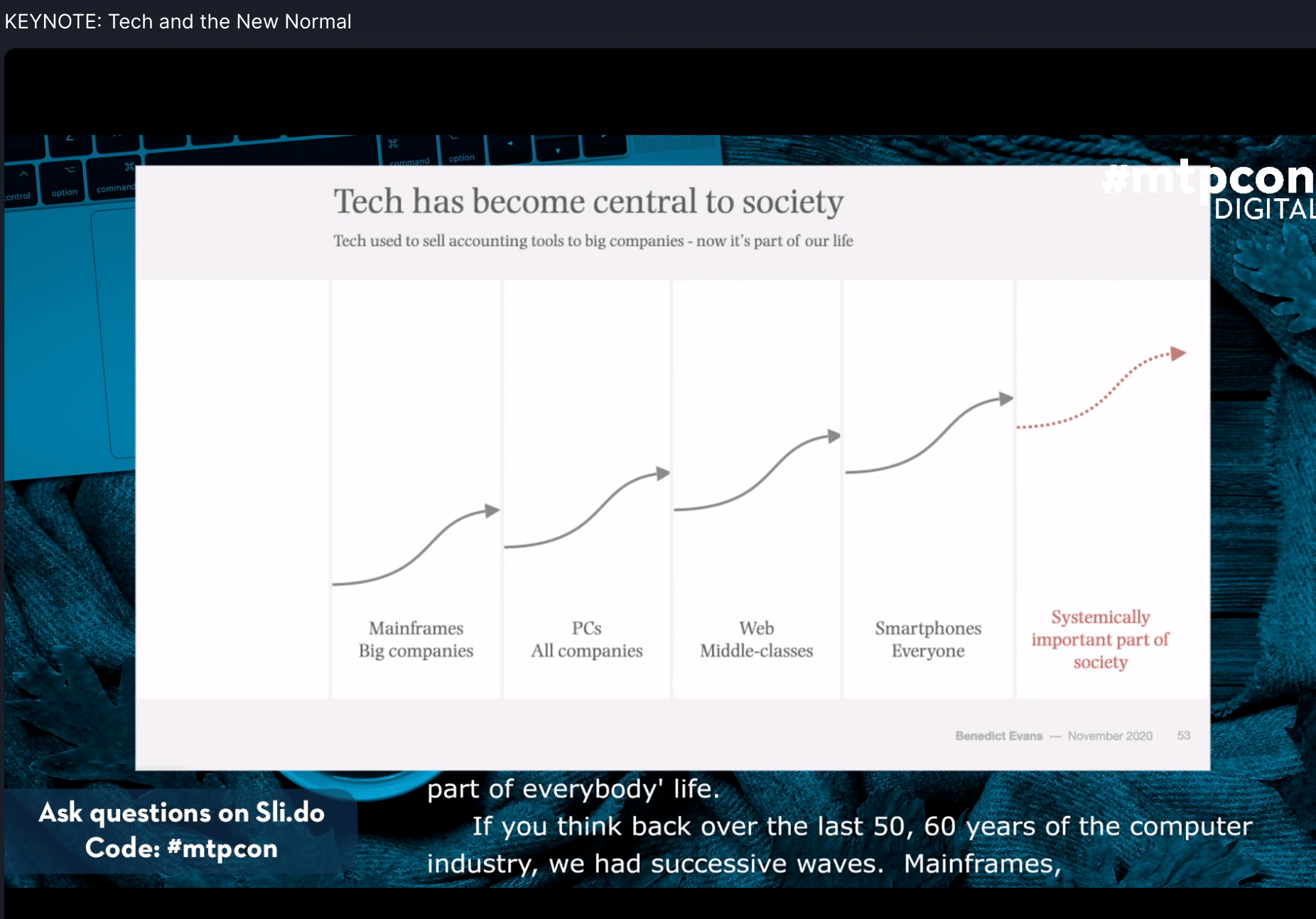
As product managers we should be asking ourselves – how can we best support this change, and how can we make sure that everyone has access to this change? There are lots of problems to be solved here. Thank you for an excellent talk, Ben.
‘Is Inclusive Design Enough?’ By Julian Thompson’s (breakout session)
Julian talked us through what inclusive design means and why it’s important to talk about it.
Design is about outcomes and shaping the future. It’s important to think about whether or not our designs are excluding certain audiences.
More importantly, it’s worth understanding how exclusion happens:
- Our biases are shaped by our experiences, what we value and what we see.
- Relationship deficit. Without the networks needed to make connections to a diverse group of people and communities. It takes time and energy to build relationships.
- Know that you don’t know everything.
This was an excellent talk to get us all thinking about inclusion, exclusion, and an ethical approach to problem solving.
‘Roadmap Prioritization.’ (Breakout session)
There was no way I was going to skip this one. It simply has to go in this Mind the Product roundup.
I was lucky enough to join the roadmap prioritization breakout session and talk with some amazing product people like Thor Mitchell (Miro) and CTodd Lombardo (Author of Roadmaps: Relaunched and Product Research Rules).
Everything from stakeholder management to timeline roadmaps to OKRs were on the table. It’s so great to see people wanting to include OKRs and outcome-based roadmaps and ditch that timeline.
‘Scaling Product Teams: In Defense of Process.’ By Spectra (Adaora) Asala
Spectra has a background in ops as well as product – but loves the chaos behind product!
Having grown several teams, Spectra is breaking down good process and bad process practices.
Some key takeaways:
- Onboarding and training: By providing templates for discovery, prioritization, and delivery, processes translate ambiguous challenges into accessible playbooks. It’s easy to suffer from framework overload.
- Frame problems vs solutions (yeah we hear that).
- Process frameworks are a great way to ground people and a wonderful entry point for anyone learning product.
- Process frameworks are a great way to ground people and a wonderful entry point for anyone learning product.
- Facilitating inclusion: From combating bias in interviews to consistent standards and criteria for career advancement. It’s hard to deliver against the values we have. It’s important to translate that into actions that our teams can follow.
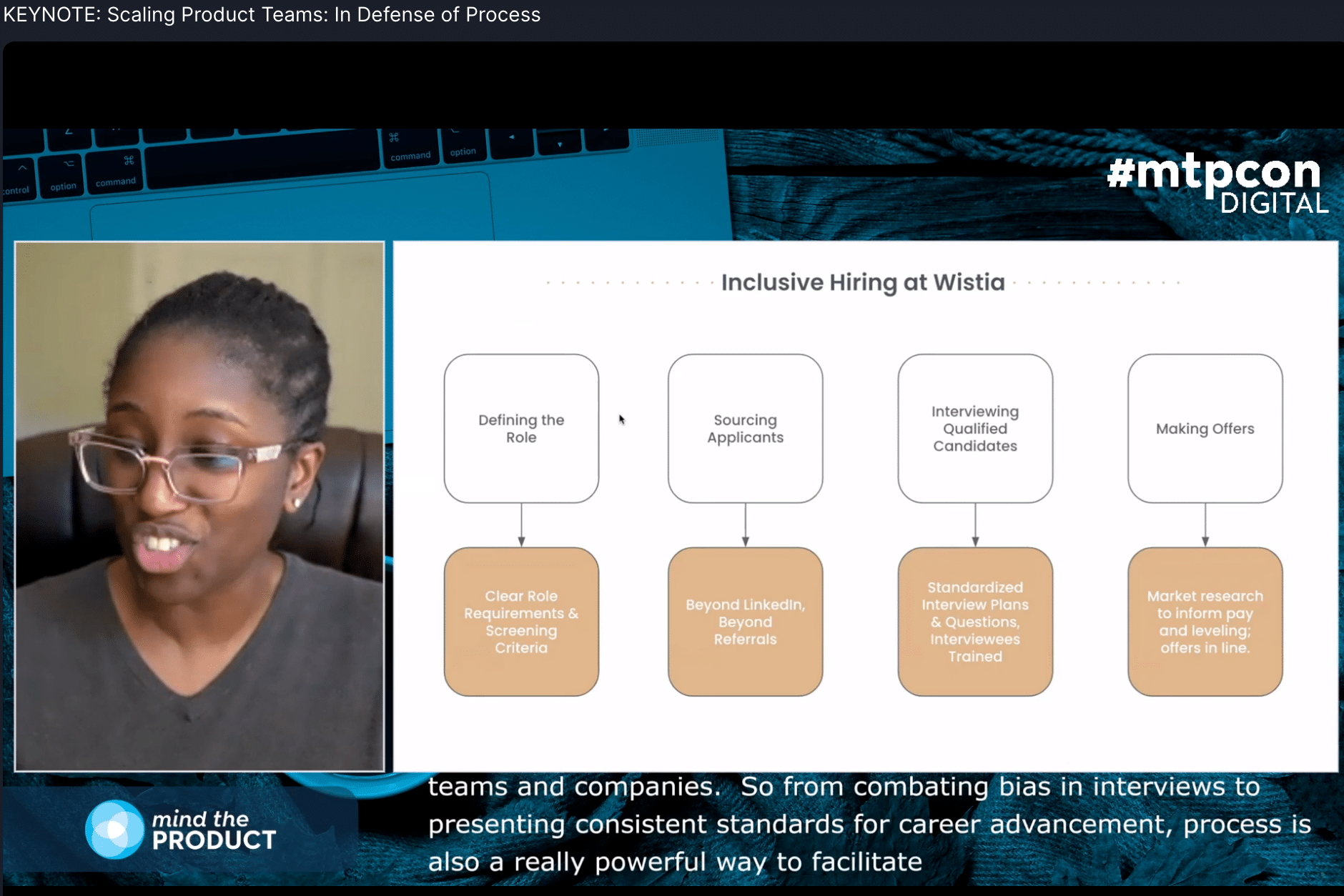
- Operationalizing ethics: How about, rather than just talking about ethics, we make sure we have a way to action on those ethics.
- Alignment: A huge part of the product manager role is to make sure everyone is on the same page. Look who’s making a guest appearance here… it’s ProdPad. We’re glad we’ve helped you, Spectra.

‘Lessons from a Product Champion.’ By Mary Poppendieck
Here is an absolutely biased comment to open this one up: this was my favorite talk of all.
Mary has a background in early product development with the 3M team. Her talk titled “No champion? No product” – dug down into what a product champion was back in the day. Often, it was the person that did everything necessary to get that product to market, working with various members in leadership positions, such as: tech (feasible), marketing (viable), design (usable).
Most importantly, Mary highlighted that in order to work as a team, you shouldn’t have conflicting goals. You had one goal that everyone worked together to achieve (hello again, OKRs).
My favorite part of her whole talk was her statement on making decisions. “Hold off,” says Mary. Why make a decision if you don’t have enough data to support making it? It’s better to wait than to build something nobody will use.
Absolute mic drop moment.
You’re a gem, Mary.
Day Two of Our Mind the Product Roundup
‘All These Worlds Are Yours.’ By Cennydd Bowles
Cennydd challenged us from the getgo to think about our use of technology. While tech has made our lives infinitely better, it has also reared its ugly head with unforeseen consequences. From Uber to Twitter – the promises of tech helping make our lives better, to a certain degree is true but it has also breached our privacy. From accidentally racist chatbots to political radicalization, the public has viewed for many years these scandals as “minor” or just did not understand.
How did we let technology get so far from its original intentions? While our hunger for technology grows, it’s the product manager’s role to keep ethics at the forefront. Work with your teams, talk to researchers, and take the time to add responsible product ethics to your product process.
Ethics might seem fuzzy, but there’s a wide body of work already available. Don’t just do the performative “ethics washing”. Do the research.
User centricity has blinded our wider responsibilities – “Our loyalties must be with the world, not just our OKRs.”
‘How to Create a Product Strategy.’ By Amy Zima
Amy Zima took us through the steps of creating a solid product strategy.
Step 0: Have a solid vision.
Why we love this: There is no strategy without vision. *CLAPS ALL AROUND*
Step 1: Understand the problem you are trying to solve.
- What problem are we solving? (data and insights)
- What needs to be true to make this vision happen?
- Who are we really building for?
- How do we differentiate? Why us?
- What does success look like? What could go wrong?
Step 2: Identify your choices and look at the pros and cons.
That’s it, you’re done. Well no, you’re not done, but you can now start creating your outcome-based roadmap, run validation, discovery, and build amazing products.
‘The Anatomy of a Pivot.’ By Asha Haji
Pivoting can be one of those moments that makes or breaks a company. Asha ran us through how some of the most well known companies came about from a pivot moment.
Did you know Slack started out as a gaming company? Originally building a game called Glitch, and with millions (although I think I heard billions) in funding, the game never actually took off. The founders then had a decision to make – take the loss or pivot to something new, and lo and behold, we now have Slack.
The bigger the company, the more dramatic the shift. Discuss how to pivot, when to pivot, and most importantly – include your product managers.
Using the pivot pyramid is also a good way to gauge who and what will affect the pivot. Regardless of your choices, understand that customers will always be affected.
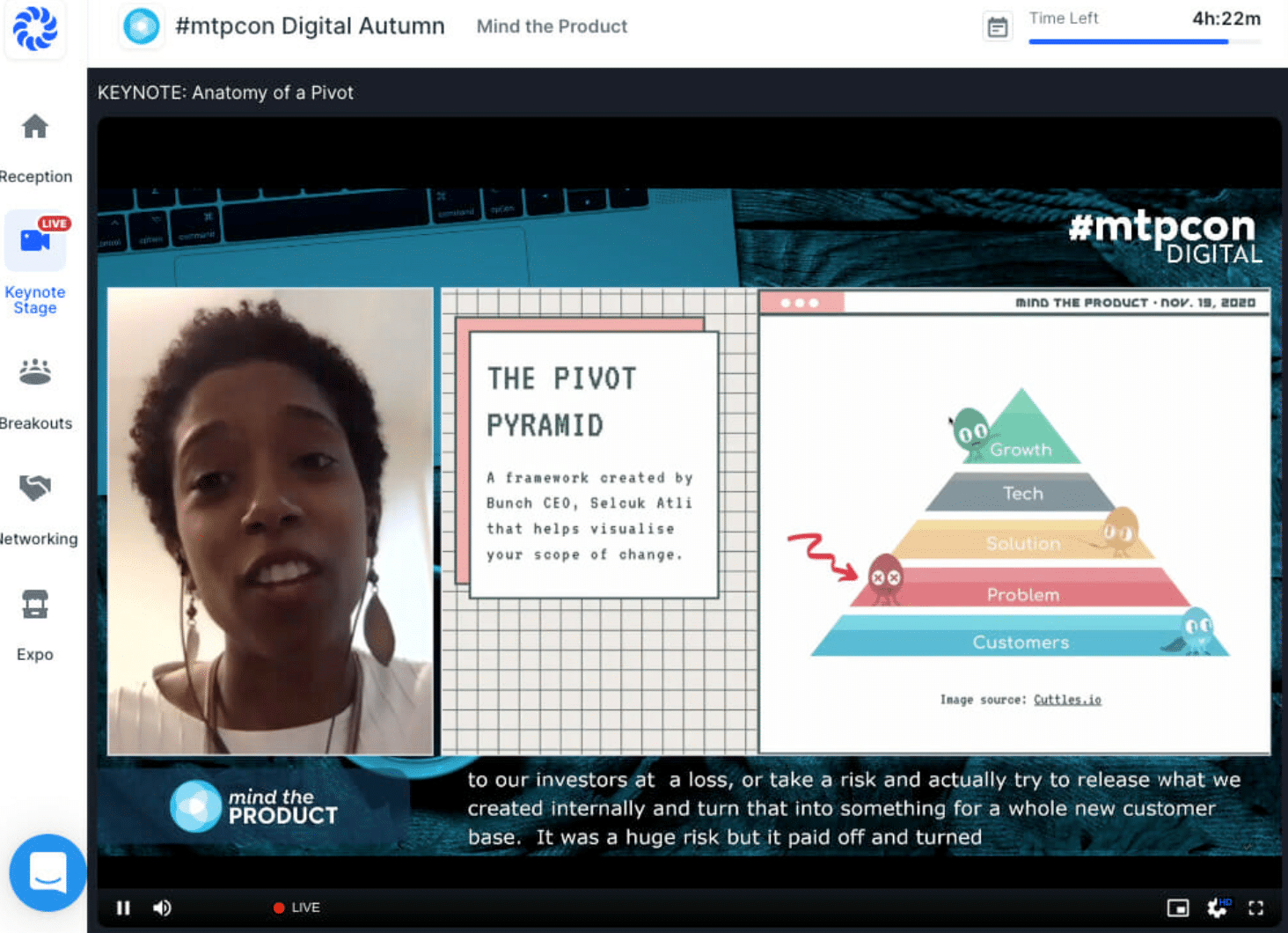
‘Product Leadership is Hard.’ By Marty Cagan
The difference between great product companies and everyone else is a gap that has not been shrinking whatsoever over the last few years. What’s the key differentiator? Good leadership.
An empowered product team is one where they exist to serve customers in ways the customers love but meet the needs of the business. In contrast, a feature team is there to serve the business. Can you really hold a feature team accountable if they’re given the solution without any other context? Of course not. The responsibility is yours, says Marty.
If you want to empower your product teams, you must provide them with context!
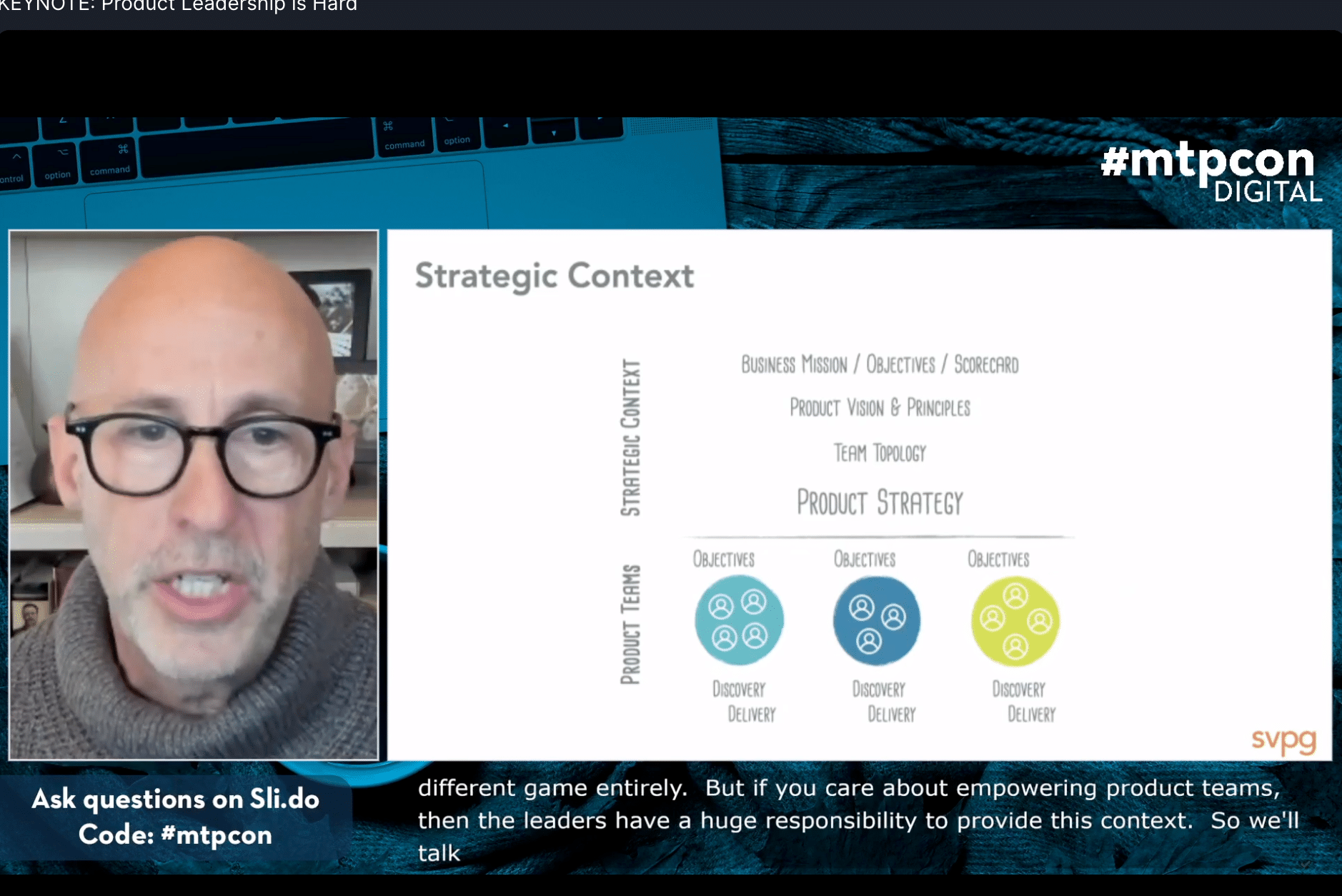
Where to start? With the product vision, of course. Step 0, remember?
A product vision first and foremost puts the customer front and center (not your company.) It’s all about understanding how the customer’s life will be better by using your product.
Good product visions are emotional. They also show which industries you will leverage, and how your teams will keep aligned against a common North Star.
Understand objectives, focus on key results to move the needle forward. Less features, more outcomes.
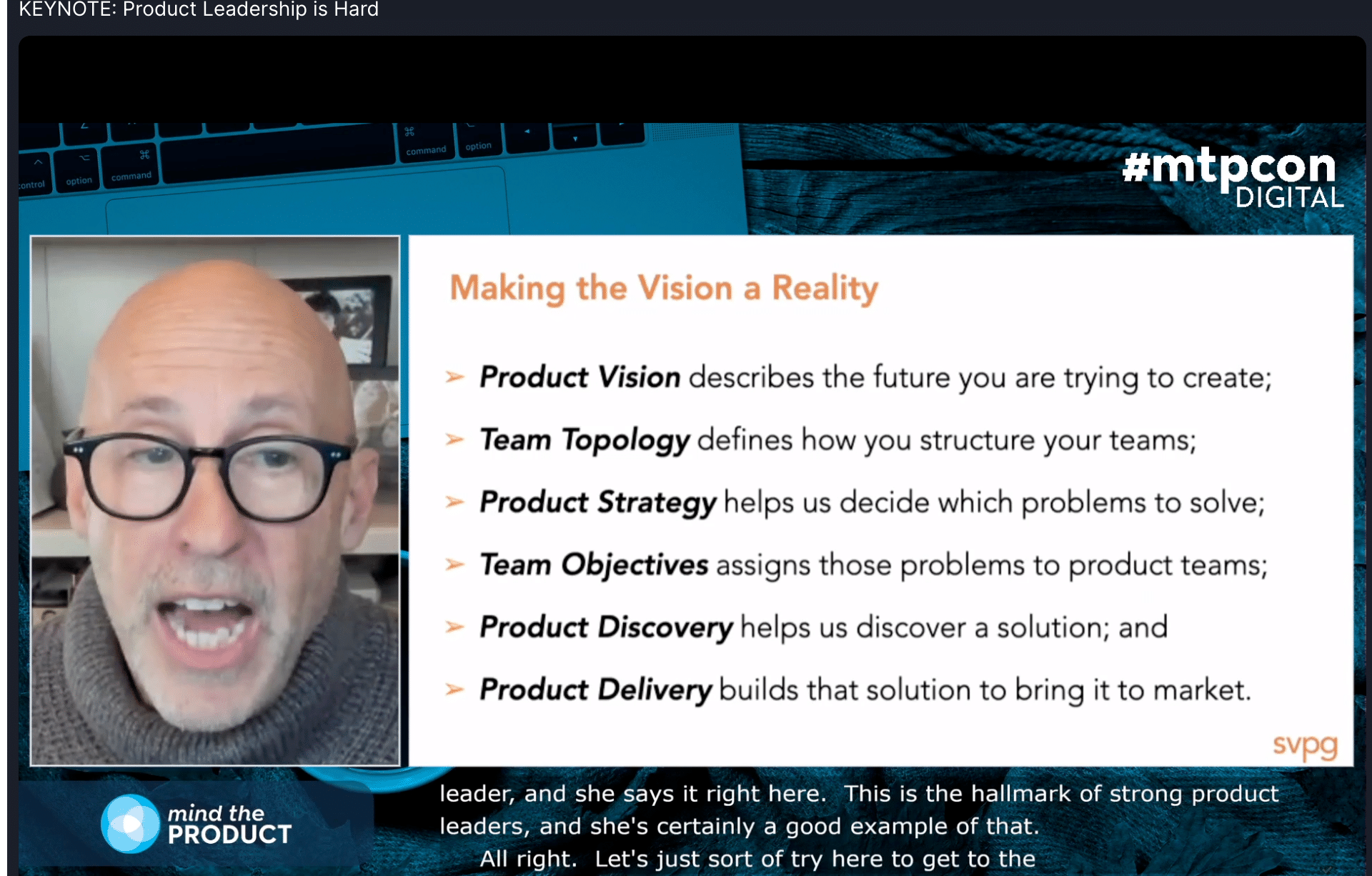
Keep Those Product Management Conference Vibes Going
Well that’s a wrap for our Mind the Product roundup. ProdPad’s virtual booth is always up and running. Head over there now and check out some of our great resources, including our sandbox where you can try out ProdPad to see if it’s the right tool for you.
If you want to chat to our product experts about product management best practices and learn a little more about ProdPad then feel free to book in for a personal demo.
